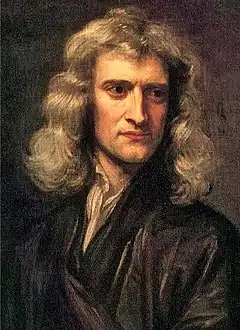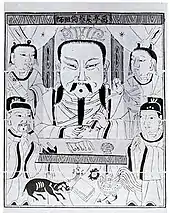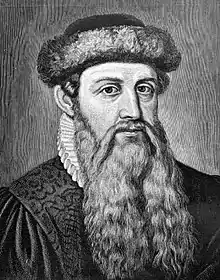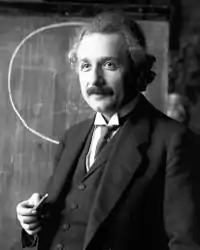The 100: A Ranking of the Most Influential Persons in History
The 100: A Ranking of the Most Influential Persons in History is a 1978 book by Michael H. Hart, an astrophysicist, alien life researcher and white separatist.[3][4][5] It was the first book of Hart, which was reprinted in 1992 with revisions. It is a ranking of the 100 people who, according to Hart, most influenced human history.[4][6]
.jpg.webp) The cover of the 1992 edition. | |
| Author | Michael H. Hart |
|---|---|
| Country | United States |
| Language | English |
| Series | 1st Edition (1978) 2nd Edition (1992) |
| Subject | Ranking, Biography, History |
| Published | 1978 (Hart Publishing company, New York)[1][2] |
| Media type | |
| ISBN | 9780806513508 |
| OCLC | 644066940 |
Hart wrote another book in 1999, entitled A View from the Year 3000,[7] voiced in the perspective of a person from that future year and ranking the most influential people in history. Roughly half of those entries are fictional people from 2000–3000, but the remainder are actual people. These were taken mostly from the 1992 edition, with some re-ranking of order.[8][9]
Summary
The first person on Hart's list is the Prophet of Islam Muhammad,[10][11][12][13] a selection that generated some controversy.[14] Hart asserted that Muhammad was "supremely successful" in both the religious and secular realms. He also believed that Muhammad's role in the development of Islam was far more influential than Jesus' collaboration in the development of Christianity.[15][16][17] He attributes the development of Christianity to St. Paul, who played a pivotal role in its dissemination.[15][18]
In the book, Hart did not include Abraham Lincoln in the list. The 1992 revisions included the demotion of figures associated with Communism, such as Vladimir Lenin and Mao Zedong, and the introduction of Mikhail Gorbachev. Hart took sides in the Shakespearean authorship issue and substituted Edward de Vere, 17th Earl of Oxford for William Shakespeare. Hart also substituted Niels Bohr and Henri Becquerel with Ernest Rutherford, thus correcting an error in the first edition. Henry Ford was also promoted from the "Honorary Mentions" list, replacing Pablo Picasso. Finally, some of the rankings were re-ordered, although no one listed in the top ten changed position.[4]
Hart's Top 10 (from the 1992 edition)
| Rank | Name | Time Frame | Image | Occupation | Influence |
|---|---|---|---|---|---|
| 1 | Muhammad | c. 570–632 |  |
Political and religious leader | Founder and the central human figure of Islam, regarded by Muslims as a prophet of God and the last messenger. Also active as a social reformer, diplomat, merchant, philosopher, orator, legislator, military leader. |
| 2 | Isaac Newton | 1643–1727 |  |
Scientist | English physicist, mathematician, astronomer, natural philosopher, alchemist, and theologian. His law of universal gravitation and three laws of motion laid the groundwork for classical mechanics. |
| 3 | Jesus of Nazareth | 7–2 BC – 26–36 AD |  |
Spiritual leader | The central figure of Christianity, revered by Christians as the Son of God and the incarnation of God. Also regarded as a major prophet in Islam. |
| 4 | Buddha (Siddartha Gautama) | 563–483 BC |  |
Philosopher | Spiritual teacher and philosopher from ancient India. Founder of Buddhism. |
| 5 | Confucius | 551–479 BC |  |
Philosopher | Chinese thinker and social philosopher, founder of Confucianism, whose teachings and philosophy have deeply influenced Chinese, Korean, Japanese, Vietnamese and Indonesian thought and life. |
| 6 | Paul of Tarsus | 5–67 AD |  |
Christian apostle | One of the most notable of early Christian missionaries, credited with proselytizing and spreading Christianity outside of Palestine (mainly to the Romans) and author of numerous letters of the New Testament of the Bible. |
| 7 | Cài Lún | 50–121 AD |  |
Inventor | Widely regarded as the inventor of paper and the papermaking process. |
| 8 | Johannes Gutenberg | 1398–1468 |  |
Inventor | German printer who invented the European mechanical printing press. |
| 9 | Christopher Columbus | 1451–1506 |  |
Explorer | Italian navigator, colonizer and explorer whose voyages led to general European awareness of the American continents. |
| 10 | Albert Einstein | 1879–1955 |  |
Scientist | German-born theoretical physicist, best known for his theory of relativity and specifically mass–energy equivalence, expressed by the equation E = mc2. |
Style
The book has been written in a style of ranking listed biographical articles, with writers own point of view about the subject persons. Hart deliberately detailed the life and present influences of the persons, and also added his own logic and opinion about the importance of their past role in the history and the present world.
Publication
The book was first published in 1978 as imprint from "Hart Publishing Company".[1][2] In 1992, the 2nd edition of the book was published with some changes in list's order. In its first publication, between 60,000 and 70,000 copies were sold, and the book has been translated into many languages.[19][20]
Analysis
Many writers have quoted the book as a worth-reading list of the historical figures. Many Muslim writers and preachers used the reference of the book for promoting support and admiration of Muhammad and Islam.
The article in Los Angeles Times notes:[21]
The key word in this inflammatory title is "Influential," not "Greatest," and therein lies Hart's justification for including many of history's bad guys (i.e., Hitler) while ignoring many of the good guys (i.e., Mother Cabrini). Hart's ranking system may seem outrageous to some—Muhammad is ranked first, followed by Newton and then Christ—but the book is nonetheless thought-provoking and utterly absorbing.
Hart states the list is "based on what actually did occur, not what should have happened." Therefore he saw no reason to "cover up the disagreeable fact of discrimination by adding a few token women" and minorities (by U.S., not world, standards). "To be influential one needs opportunity as well as talent. If Einstein (No. 10) had come from Africa, he probably would not have invented the theory of relativity.[22] The article in Business Horizons notes: "While it is both entertaining and instructive to examine the lives of those individuals who stand out in history as giants, perhaps the greatest value of Mr. Hart's book lies in its ability to make the reader think seriously about his or her own values."[23]
The article in The Canberra Times notes: "Hart's original book had only two women in the list: Queen Isabella I at No 65, and Elizabeth I practically just squeezing in at No 94. This was disgraceful, of course. Was Hart being a sexist pig? No, but in case you weren't paying attention in class, history has been appallingly sexist. Hart obviously had no room for tokenism. (He presumably ignored calls of "Why don't you include Marie Curie or Joan of Arc, just to be a gentleman?") If you protest his inclusion of notorious figures like Hitler and Genghis Khan, or obscure ones like 'Umar ibn al-Khattab, I suggest you look up "influential" in a dictionary. If you'd prefer a nice list, with no bad guys, you'll be happy to know about Simon Montefiore's latest book, Heroes: History's Greatest Men and Women. It's not exactly a new idea, but as the "heroes" include Margaret Thatcher, it's bound to get plenty of laughs. It includes plenty of women in its ranks, so it gives us a slightly more balanced history than the real-life one covered by Hart."[24]
Reviews
- Positive reviews
In 1988, Hosni Mubarak, the President of Egypt, honored Michael H. Hart, the author of the book, in Cairo for naming Mohammed as the most influential person in history.[25]
Mike Barnicle wrote in The Boston Globe, "In terms of upsetting people, Michael Hart is the new champion."[26] The Washington Post asked Chaim Potok, Edwin O. Reischauer, and Barbara W. Tuchman to assess the list.[27]
- Arnie Arnesen wrote in The Boston Globe, "He brilliantly defends his choices and their ranking with pithy descriptions of each.[28] Janice Harayda wrote in The Plain Dealer, "Hart generally presents his evidence clearly, intelligently and without special pleading. This tends to give his arguments plausibility even when their conclusions are debatable".[29]
- Negative reviews
Charles Solomon of the Los Angeles Times criticized the book, writing, "his jejune volume stands out as a textbook example of culutural parochialism: Hart's list includes three Africans, two women and one South American. His mini-biographies of his choices feature such arbitrary, unsubstantiated pronouncements as ...":[30] Ken McGoogan wrote in the Calgary Herald wrote, "If Michael H. Hart has done nothing else, he has demonstrated that picking a public fight can be profitable."[19]
Frederic Raphael wrote in The Sunday Times, "If it has a weakness, it is not inaccuracy (the exposition seems clear and the facts reliable), but monotony. The writing is unpretentious, but it is also po-faced. When it comes to the scientific fraternity, there is little awareness of confusions or contradictions. In Newton's case, who would guess that his rationalisation of science was accompanied, perhaps fuelled, by a belief in alchemy which took him at least to the edge of madness? Perhaps, by the same token, if Hart had not been driven by his ranking frenzy, he would not have had the energy to complete this eminently decent, marginally dotty compilation. Its only serious deficiency is the lack of even a rudimentary bibliography."[31]
Barbara W. Tuchman wrote in The Washington Post, "Mr. Hart finds it "worth noting" that his list contains only three persons who lived from the 10th to the 15th centuries. This demonstrates only Mr. Hart's limitations, not those of the Middle Ages."[32] Walter C. Langsam wrote in The Cincinnati Enquirer, "When an Enquirer editor asked me whether I would comment on Michael Hart's [book], I replied I had not read the book and, indeed, had no desire to read it. For, in my opinion, no one can rank accurately the hundred most-anything among all the men and women who have peopled the Earth since the beginning of history."
Reception
For placing Muhammad in first place of the list, the book received several controversial reviews from western critics[14][33] [34][35][36][37][38][39][40][41][42] [43] but the book was extremely welcomed and outburst with positive reviews in the Muslim world, and the book is often cited in the Muslim writers' book including Ayatollah Sayed Muhammad al-Shirazi, Ahmed Deedat etc.[44][45][46][47][48] In 1988, the former contemporary Egyptian president Hosni Mubarak honoured Michael Hart for placing Muhammad in first place.[25]
References
- "Publisher: Hart Pub. Co". Open Library. Retrieved 28 July 2019.
- "Michael Hart, eBook, Biography – search". Open Library. Retrieved 28 July 2019.
- Interview with Michael H. Hart by Russell K. Neili, April 14, 2000. Carol M. Swain; Russ Nieli (24 March 2003). Contemporary Voices of White Nationalism in America. Cambridge University Press. p. 201. ISBN 978-0-521-81673-1. "I (like other white separatists) resent being called a white supremacist."
- Editors of LIFE (2016). LIFE 100 People Who Changed the World. Time Inc. Books. ISBN 9781618934710.CS1 maint: extra text: authors list (link)
- Newsweek. Newsweek, Incorporated. 28 August 1978. Retrieved 28 July 2019.
- Michael H. Hart The 100: A Ranking of the Most Influential Persons in History. first published in 1978, reprinted with minor revisions 1992. ISBN 978-0-8065-1068-2
- Michael H. Hart. A view from the year 3000: a ranking of the 100 most influential persons of all time; first published in 1999
- Nagel, Stuart S. (2001). Handbook of Policy Creativity: Creativity at the cutting edge. Nova Publishers. p. 14. ISBN 9781590330302. Retrieved 28 July 2019.
- Humanity three thousand. Foundation for the Future. 2000. ISBN 9780967725239.
- Nduka, Otonti A.; Iheoma, E. O. (1983). New Perspectives in Moral Education. Evans Bros. p. 74. ISBN 9789781672279. Retrieved 28 July 2019.
- North, Peter; Tripp, Harvey (2009). CultureShock! Saudi Arabia: A Survival Guide to Customs and Etiquette. Marshall Cavendish International Asia Pte Ltd. p. 6. ISBN 9789814435277. Retrieved 28 July 2019.
- Iqbal, Sir Muhammad; Abbas, Syed Ghulam (1997). Dr. Muhammad Iqbal, the humanist: a reassessment of the poetry and personality of the poet-philosopher of the East. Iqbal Academy. p. XVIII. ISBN 9789694160306. Retrieved 28 July 2019.
- The 100: A Ranking of the Most Influential Persons in History
- Alphonse Dougan, "Understanding Prophet Muhammad Beyond the Stereotypes", The Fountain, Issue 46 (April–June 2004).
- Malik, Saeed (2009). A Perspective on the Signs of Al-Quran: Through the Prism of the Heart (2nd Edition October 2010 ed.). Booksurge. p. 112. ISBN 9781439239629. Retrieved 28 July 2019.
- Have You Discovered It's Real Beauty?. Peace Vision. ISBN 9781471607370. Retrieved 28 July 2019.
- Deedat, Ahmed (2001). Muhammad, The Greatest. Islamic Presentation Committee. ISBN 9781471604416.
- White, James W. (2014). Brief Christian Histories: Getting a Sense of Our Long Story. Wipf and Stock Publishers. p. 216. ISBN 9781630873059. Retrieved 28 July 2019.
- McGoogan, Ken (1993-01-08). "What to do when your kid drives you crazy?". Calgary Herald. Archived from the original on 2019-08-04. Retrieved 2019-08-04 – via Newspapers.com.
- Petersen, Clarence (1987-11-01). "Roger's Version, by John Updike (Fawcett/Crest, $4.95)". Chicago Tribune. Archived from the original on 2019-08-04. Retrieved 2019-08-04.
- Cox, Douglas (1978-05-21). "The 100: A Ranking of the Most Influential Persons in History". Los Angeles Times. Archived from the original on 2019-08-04. Retrieved 2019-08-04 – via Newspapers.com.
- Green, Blake (1978-09-22). "The 100 Most Influential Persons in History". San Francisco Chronicle. p. 24.
- Heerema, Douglas (February 1980). "The 100: A Ranking of the Most Influential Persons in History by Michael Hart". Business Horizons. 23 (1): 91–92. doi:10.1016/0007-6813(80)90119-6. ISSN 0007-6813.
- Juddery, Mark (2009-06-15). "Insert". The Canberra Times. Archived from the original on 2019-08-04. Retrieved 2019-08-04.
- Fellner, Jonathan (1988-10-19). "Egyptian president to honor AACC astronomer for history". The Baltimore Sun. Archived from the original on 2019-08-04. Retrieved 2019-08-04 – via Newspapers.com.
- Barnicle, Mike (1978-10-20). "Hart has placed Mohammed No. 1 because he was the founder of Islam. This is a religion and not a restaurant in Worcester". The Boston Globe. Archived from the original on 2019-08-04. Retrieved 2019-08-04. The second page of the article is at https://www.newspapers.com/clip/34545347/the_boston_globe/Internet Archive.
- Omang, Joanne (1978-11-04). "Author lists top 100: Who left greatest mark on history?". Mansfield News Journal. The Washington Post. Archived from the original on 2019-08-04. Retrieved 2019-08-04 – via Newspapers.com.
- Arnesen, Arnie (2002-01-20). "Lessons for today's state from Confucius". The Boston Globe. Archived from the original on 2019-08-04. Retrieved 2019-08-04 – via Newspapers.com.
- Harayda, Janice (1993-05-23). "Most Influential People in History?". The Plain Dealer. Archived from the original on 2019-08-04. Retrieved 2019-08-04.
- Solomon, Charles (1992-11-29). "The 100: A Ranking of the Most Influential Persons in History". Los Angeles Times. Archived from the original on 2019-08-04. Retrieved 2019-08-04 – via Newspapers.com.
- Raphael, Frederic (1993-04-25). "Success stories – History". The Sunday Times. Archived from the original on 2019-08-04. Retrieved 2019-08-04.
- Potok, Chaim; Reischauer, Edwin O.; Tuchman, Barbara W. (1978-11-19). "History's 100 Most Influential People A Matter Of Opinion". The Cincinnati Enquirer. The Washington Post. Archived from the original on 2019-08-04. Retrieved 2019-08-04 – via Newspapers.com.
- Yuan, Haiwang (2010). This is China: The First 5,000 Years. Berkshire Publishing. p. 35. ISBN 9781933782768. Retrieved 31 July 2019.
- Freedman, David Noel; McClymond, Michael J. (2001). The Rivers of Paradise: Moses, Buddha, Confucius, Jesus, and Muhammad as Religious Founders. Wm. B. Eerdmans Publishing. p. 676. ISBN 9780802829573. Retrieved 31 July 2019.
- Benson, Garth; Glasberg, Ronald; Griffith, Bryant (1998). Perspectives on the Unity and Integration of Knowledge. P. Lang. p. 90. ISBN 9780820434872. Retrieved 31 July 2019.
- Publishing, Pearson Custom (2000). Reasoning and Writing. Pearson Custom Publishing. p. 26. ISBN 9780536615022.
- Ultimate Reality and Meaning. Van Gorcum. 1994. p. 171.
- Science Digest. Science Digest. 1978. Retrieved 31 July 2019.
- "Korea Now". Korea Herald. 32: 49. July 2003.
- Senior Scholastic. 111. Scholastic Corporation. September 1978.
- Books, Honor (2003). You Can Be a World Changer. David C. Cook. pp. 281, 284, 286. ISBN 9781562928070.
- Books in Print. 1, 2, 3, 4, 7, 10. R. R. Bowker Company. 1997. p. 3601. ISBN 9780835239356.
- Kosova, Hakan (2007). A Tribute to the Prophet Muhammad. Tughra Books. ISBN 9781597846028.
- Ramadan, Hisham M. (2006). Understanding Islamic Law: From Classical to Contemporary. Rowman Altamira. ISBN 9780759114340.
- Malik, Muhammad Farooq-i-Azam (1997). English Translation of the Meaning of Al-Qur'an: The Guidance for Mankind (English Only). The Institute of Islamic Knowledge. p. 21. ISBN 9780911119770. Retrieved 31 July 2019.
- de_paul_legislation. IslamKotob. p. 5. Retrieved 31 July 2019.
- Abbas, Syed Ghulam; Anis, Mir Babbar Ali (1983). The Immortal Poetry & Mir Anis: With the Versified Translation of a Marsia of Mir Anis. Majlis-e-Milli, Pakistan. p. XV. Retrieved 31 July 2019.
- Association, American Book Trade; Union, American Book Trade; Philadelphia, Book Trade Association of; Trade, Publishers' Board of (1992). Publishers Weekly. Whitinsville, Mass. : R. R. Bowker Company. p. 156. ISBN 9780312081805. Retrieved 31 July 2019.